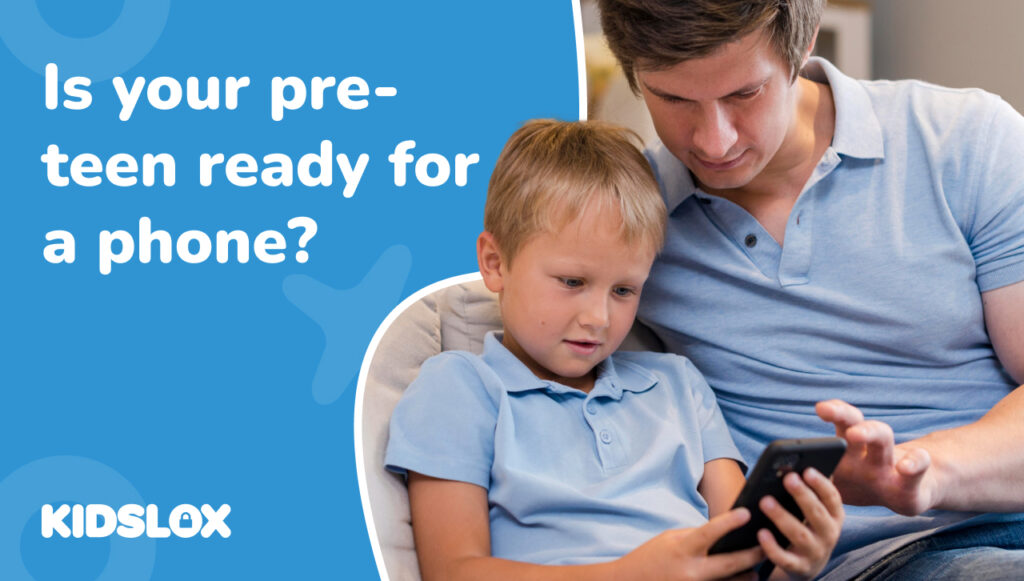When Is the Right Time for a Smartphone?
If you’ve got a child around 10 or 12, you’ll know just how quickly they become interested in technology. One minute they’re asking to play a game on your phone, and the next they’re begging for a smartphone of their own.
For parents, this can be a difficult decision. Technology is a big part of life today – from schoolwork to socialising – but giving preteens too much freedom too early can lead to problems. Smartphones, social media, gaming and constant notifications can all affect their mood, sleep and confidence.
So how can you decide when your pre‑teen is ready for their own phone? And what steps can you take to make sure they develop healthy habits around technology?
Why the Preteen Years Are So Important
The preteen years are a unique stage of development. Children are craving more independence, but they still need lots of guidance. They’re forming their identity, learning how to manage emotions, and becoming more aware of what their friends think.
Technology can make this stage more complicated. Peer pressure to have a phone or join social media can be intense. Apps are designed to be addictive, and preteens don’t yet have the self‑control to set their own limits.
That’s why many experts suggest holding off on giving smartphones until at least age 13. Giving a phone too early can have an impact on sleep, attention, behaviour and even self‑esteem.
How Smartphones and Tech Affect Preteens
Sleep and Routines
Even the most responsible 10‑year‑old boy or girl will find it hard to ignore a buzzing phone at night. Preteens often check messages or scroll through videos long after bedtime, especially if the device is in their room.
Lack of sleep can lead to grumpiness, poor focus at school and more arguments at home. Over time, tiredness can also affect physical health, lowering immunity and making children more prone to illness.
Parents who use a behaviour or reward chart might notice these effects quickly – mornings become more stressful, homework takes longer and bedtime routines fall apart. Simple rules like “no phones in bedrooms” or “devices off one hour before bed” can make a huge difference.
Mood and Confidence
Social media can be tough for preteens to navigate. Comparing themselves to others, worrying about likes, or feeling left out of group chats can all knock their confidence.
Preteens are still figuring out who they are. If they rely too much on technology for validation, it can make them more anxious or insecure. They might also see upsetting content online – even without meaning to – which can affect their mood for hours afterwards.
Talking about how social media works, and reminding your child that online “likes” don’t define their worth, can help them develop a healthier relationship with technology.
Focus at School
Phones can be a big distraction during the school day. Even if children aren’t allowed to use them in class, just knowing the phone is nearby can pull their attention away from lessons.
Teachers often report that students who spend more time on devices at home find it harder to focus at school. They might also miss out on face‑to‑face conversations and playground games, which are essential for social development at this age.
Encouraging preteens to leave phones at home, or setting app limits during school hours, can help them focus and stay engaged.
Social Skills and Independence
Technology can be amazing for learning and creativity, but it can also replace real‑life experiences. If a preteen is spending most of their free time on a screen, they might miss opportunities to build confidence through hobbies, sports, or spending time with friends in person.
While phones can give children a sense of independence, they can also make it harder for them to solve problems on their own. Being constantly able to message parents can stop them from learning how to cope with challenges like getting lost, asking for help, or making decisions in the moment.
Why Many Parents Choose to Wait
Lots of families decide to wait until their child is emotionally ready – not just a certain age – before handing over a smartphone.
Some parents use movements like “Wait Until 8th” or school‑wide agreements to delay smartphones until at least Year 8. This takes the pressure off both parents and children who might otherwise feel left out.
Waiting can also give preteens time to build important life skills – like organising homework, managing screen‑free time, or walking to school independently – before adding the responsibility of a phone.
How to Decide If Your Preteen Is Ready for a Cell
There’s no magic birthday when a child suddenly becomes responsible enough to handle a smartphone. Every preteen is different – some might show great maturity at 11, while others still need lots of support well into their teens.
Instead of focusing only on age, it can help to think about your child’s overall readiness. Here are some useful questions to ask yourself:
- Do they follow household rules without constant reminders?
If your child can stick to basic routines – like finishing homework, helping with chores, or keeping to bedtime – it’s a good sign they can manage new responsibilities. A phone adds extra rules, such as time limits and appropriate app use, so practising with existing boundaries can prepare them.
- Can they handle limits on screen time calmly?
Think about how your child reacts when you ask them to turn off the TV, put down a tablet, or leave a game. Do they argue or get upset, or can they switch off without too much fuss? A smartphone offers constant entertainment, so self‑control is essential.
- Do they understand online safety and privacy?
Before giving a smartphone, talk to your child about sharing personal information, speaking to strangers online, and why it’s important to be careful with photos and messages. If they already grasp these ideas, they’ll be better prepared for the online world.
- Are they able to cope with social disappointments without getting too upset?
Friendships at this age can be complicated. Social media adds another layer – group chats, likes, and posts can all lead to feelings of exclusion. If your pre‑teen gets very upset about social issues offline, they might find the online version even harder to handle.
If your answers to some of these questions are “not yet,” that’s completely fine. Children develop at different speeds, and waiting a bit longer can prevent a lot of stress for both parent and child.
While you wait, you can still help your preteen build the skills they’ll need when they eventually get a phone. This might include using a behaviour or reward chart to encourage positive habits, giving them a basic call‑and‑text phone for safety, or letting them earn small responsibilities in stages – like borrowing your phone for short periods or using certain apps under supervision.
Taking a gradual approach helps your child feel trusted, while giving you confidence that when they do get a smartphone, they’ll be ready to handle it responsibly.
Technology and Preteens – Practical Tips for Parents
- Start Small
You don’t have to jump straight to a smartphone. A basic phone or smartwatch can let your child text or call you without access to social media or online games.
- Use a Behaviour Chart
Tools like a 12‑year‑old behaviour chart can help children work towards more responsibility. You might reward things like finishing homework, following bedtime rules, or earning screen time with positive behaviour.
- Set Clear Rules
Create family phone rules together, such as:
- Devices stay downstairs at night.
- No phones during dinner.
- Screens are turned off one hour before bed.
Agreeing these together helps avoid conflict later.
- Talk About Online Safety
Even if they don’t have a phone yet, teach your pre‑teen about online privacy, kindness and the risks of sharing personal information.
- Be a Role Model
Children copy what they see. Showing that you can put your own phone down helps your child understand that screen time should have limits for everyone.
Building Healthy Tech Habits Together
Technology isn’t bad – it’s an incredible tool when used well. But for preteens, having too much freedom too soon can mean losing sleep, struggling at school, or feeling anxious about social media.
The best approach is to delay smartphones until your child shows they’re ready, while helping them learn healthy habits along the way.
By taking things slowly, setting boundaries, and using tools like Kidslox to manage screen time, you can help your child enjoy technology safely and responsibly – without it taking over their life.
When the time is right, they’ll be more prepared to handle the freedom that comes with having a phone of their own.





